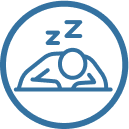LONSURF Side Effects
Potential Side Effects
Low blood counts are common with LONSURF and can sometimes be severe and life-threatening. LONSURF can cause a decrease in your white blood cells, red blood cells, and platelets. Low white blood cells can make you more likely to get serious infections that could lead to death. Your healthcare provider may lower your dose of LONSURF or stop LONSURF if you have low white blood cell or platelet counts.
Your healthcare provider should do blood tests before you receive LONSURF, at day 15 during treatment with LONSURF, and as needed to check your blood cell counts.
Tell your healthcare provider right away if you get any of the following signs and symptoms of infection during treatment with LONSURF: fever, chills, or body aches.
What are the most common side effects?
The most common side effects of LONSURF when used in combination with bevacizumab include:
- Low blood counts
- Tiredness and weakness
- Nausea
- Certain abnormal liver function blood tests
- Decreased salt (sodium) in your blood
- Diarrhea
- Stomach-area (abdominal) pain
- Decreased appetite
The most common side effects of LONSURF when used alone include:
- Low blood counts
- Tiredness and weakness
- Nausea
- Decreased appetite
- Diarrhea
- Vomiting
- Stomach-area (abdominal) pain
- Fever
Tell your healthcare provider if you have nausea, vomiting, or diarrhea that gets worse or does not go away. These are not all of the possible side effects of LONSURF.
A thermometer is available within the Treatment Kit to remind you to check your temperature. It also includes a treatment calendar that has a place for you to record your temperature and side effects. Discuss any changes in temperature and side effects with your healthcare provider at your next appointment. A digital version of the calendar is also available here.


You can also call the Taiho Oncology 24/7 hotline with questions about, or to report, side effects with LONSURF at 1‑844‑US‑TAIHO (1‑844‑878‑2446). You may report side effects to the FDA at 1‑800‑FDA‑1088 (1‑800‑332‑1088).















